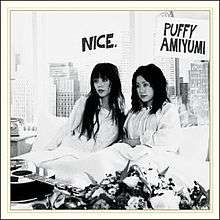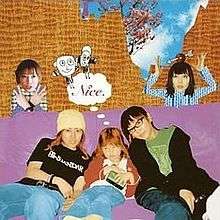Nice (Puffy AmiYumi album)
Nice (stylised as Nice.) is an album by Japanese pop group PUFFY, released in 2003 it is their third North American album. The US release featured a few track changes: "Atarashii hibi" and "Tomodachi" were replaced with "Urei", "Teen Titans Theme" and "Planet Tokyo", an English song with the melody of "Akai buranko". The album peaked at No. 20 on the Japanese Albums Chart.[2]
| Nice. | ||||
|---|---|---|---|---|
 | ||||
| Studio album by | ||||
| Released | January 22, 2003 (JA) August 12, 2003 (US) August 19, 2003 (CA) | |||
| Recorded | The Steakhouse Studio, Cello Studio, Sony Music Studios, Tokyo; Sunset Sound, Sub Jersey Studios, Vibratorium, Mansfield Lodge, Andy's house, John's house | |||
| Genre | Pop, rock, ska | |||
| Length | 48:35 (US) 51:08 (Japan) | |||
| Label | Epic/Sony ESCL-2357 Bar None BRN-CD-142 | |||
| Producer | Andy Sturmer | |||
| PUFFY chronology | ||||
| ||||
| Japanese cover | ||||
 Japanese Epic/Sony Cover (2003) | ||||
| Review scores | |
|---|---|
| Source | Rating |
| Allmusic | |
The introductory carrier melody of "K2G(Kimi Ni Go!)" was derived from the introductory interlude of the song "How Was It for You?" by James, from this English Postpunk/Britpop band's third album, Gold Mother (1990).
The cover art for the American version of the album is a homage to John Lennon and Yoko Ono's "bed-In" peace protests held in 1969. The songs Planet Tokyo and K2G (Kimi Ni Go!) are featured in the Hi Hi Puffy AmiYumi World Tour Game and Teen Titans.
Track listing
|
|
Personnel
Puffy AmiYumi
- Ami Onuki - vocals, harmony
- Yumi Yoshimura - vocals, harmony
Additional personnel
- Andy Sturmer - drums, guitar, drum programming, ARP synthesizer, Moog synthesizer, guitars, pipe organ, mellotron, percussion, vibraphone, keyboards, trumpet, marimba, bass, Prophet synthesizer, Fender Rhodes, vocal kazoo, claps, piano, acoustic guitar, ARP string ensemble, harmony, VOX Continental organ, BVO
- John Fields - guitars, bass, piano, vocoder, Hammond organ B3, Roland Space Echo, chamberlin, Farfisa organ, strange echoes,
- Wookie Von Crozier - crazy drum fill
- Chris James - drums, Wurlitzer, synthesized blips and bleeps, toy piano, chamberlain
- Printz Board - flugelhorn
- Bleu - 12 string guitar
- Dean Parks - banjo, acoustic guitar
- Elizabeth Lea - trombone
- The Horndogs - horns
- James Childs - guitars
- Phillip Broussard, Jr. - harmonies and chorus
- Toishi Toshikazu - harmonies and chorus
Production
- Producer: Andy Sturmer
- Instrument recording: John Fields
- Vocal recording: Thom Russo, John Fields
- Mixing: Thom Russo, John Fields
- Mastering: Kotetsu Tohru
- Mastering assistants: Phillip Broussard, Jr., Ohno, Shiota Osamu, Hatagoshi Hideyasu
- Musical instruments technician: Oba Toshimasa
- A&R: June Shinozaki
- Interpreter: Takamizawa Mai
- Art direction: Central 67
- Design: Central 67
- Photography: Uchida Shoji
- Hair and make-up: Shuma Tesuro
- Styling: Miyajima Takahiro
References
- Sendra, Tim. "Allmusic review". Rovi Corporation. Retrieved 2012-02-08.
- "Oricon charts listing". Oricon. Retrieved 2012-02-08.